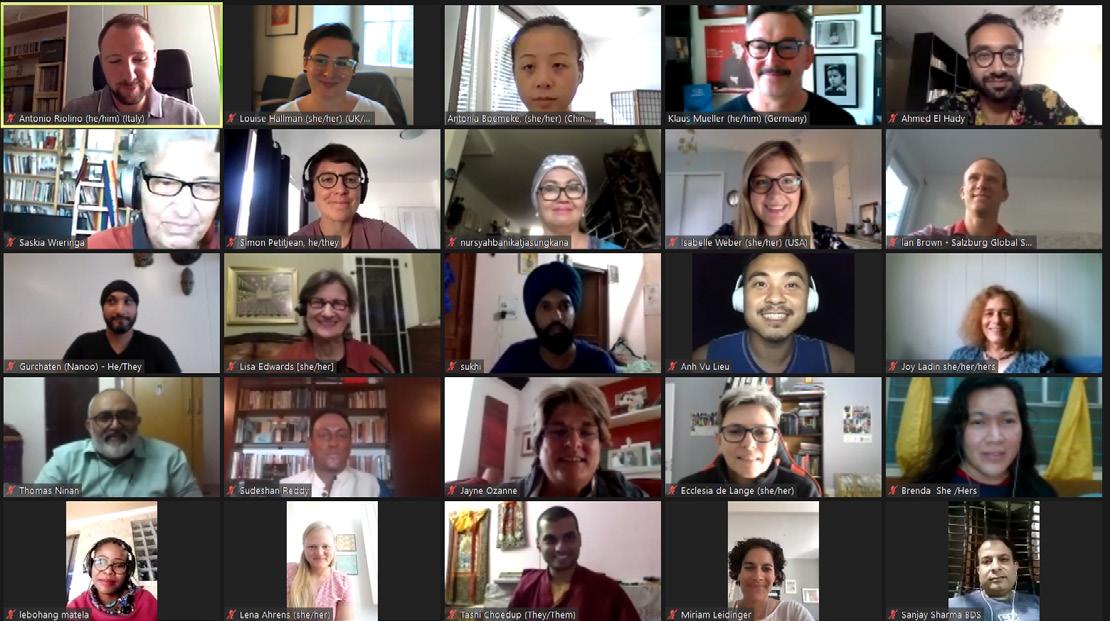
8 minute read
BLOG SERIES TELLING OUR OWN STORIES
Ecuadorian photographer Paola Paredes documented her coming out to her parents in the experimental photography project “Unveiled” (2014) and presented her new project on illegal conversion clinics in her blog, These Staged Images Allow Us To See What Was Never Meant To Be Seen.
BLOG SERIES
Starting at the beginning of August through to the public webinar in November, the Salzburg Global LGBT* Forum published weekly blogs from Fellows of the Global Online Forum on LGBT* and Faith, focusing on two leading questions: • What is needed for religious communities and leaders to be instrumental in promoting the wellbeing, equality, and inclusion of LGBT people in faith communities and society? • How do LGBT people, today and throughout history, enrich and change the religious communities of which they are a part?
The blogs were published on SalzburgGlobal.org and then posted on the Facebook page of Salzburg Global Seminar as well as on other social media platforms where they were shared further by individual Fellows and their organizations. Our partner ILGA Asia also
REACHING 25,000 PEOPLE
Through this virtual medium, the Salzburg Global LGBT* Forum was able to reach over 25,000 people through the Facebook posts alone, with an average reach of over 1500 people per blog post, not including when individuals shared the blogs independently. On Facebook, a conversation was established with over 1200 interactions, including likes, comments and shares, from readers. The blogs were also shared further on other social media platforms including Twitter, LinkedIn and Instagram.
republished the series on their Facebook page. Fellows, many of them with a large network, also re-published the blogs series for their communities and reported back that this led to new and encouraging conversations with faith leaders they otherwise would not have had. These blogs generated comments from around the world and established a dialogue between Fellows and a broader audience. Readers could also subscribe to the newsletter to be alerted to each new blog. The blog series thus achieved its goal in broadcasting the personal faith and inclusion journeys of Fellows. By using a social media platform, an outside audience could be brought in expanding the conversation and dialogue.
Through the social media blog series, the Salzburg Global LGBT* Forum developed a space for reflection and gave visibility to voices of established and emerging leaders. This blog series hosted the stories of 16 of our Fellows, who came from a variety of ethnic, sexual orientation, gender identity, and faith backgrounds. They courageously shared their personal journeys and obstacles to advance inclusive approaches.
This series allowed Fellows and their stories to connect to a global conversation and engage with each other. Throughout the 16 blogs, there were many key takeaways that, although the authors differ in culture, religion, and geographic location, connect our Fellows together on their separate faith journeys. The diverse histories of religions offer additional unique challenges in the fight for inclusion around the world. Understanding the unique cultural heritage behind each religion is a necessary step in finding LGBT inclusion not just within a religious community but throughout society. Religion impacts everyday community life and LGBT inclusion on the religious frontier can make a difference throughout cultures. Fellows have found that the hard work of inclusion does not require a theological revolution, but a new mindset within the community itself that decouples social community from these theological imperatives.
Many LGBT people of faith face dual-ostracization in society: they are rejected from their religious communities for their LGBT identity and from their LGBT community for their faith. In the face of animosity, LGBT people insisting on inclusion in faith spheres is the driving force for change. As they tell their stories, religious communities can open their minds and listen, potentially finding that they are able to find love, compassion, and empathy for LGBT people, recognizing that our diversity is what makes our communities stronger.
The personal journeys shared in the blog posts prompted the dialogue of the online convenings of Fellows that took place over the past three months. The resulting guiding questions and lead themes from these convenings were integral to the development of the public webinar.
TELLING OUR OWN STORIES
Joy Ladin, the first openly-transgender professor at an Orthodox Jewish institution based in the United States wrote a blog post entitled, “Religious Communities and Leaders
Need to Stop Seeing LGBT* People as Other,
as Them, and Start Seeing Them as Us”, which centers on how recognition and appreciation of our differences can make our communities stronger and more diverse. Giti Thadani, a founding member of the first Indian lesbian archive Sakhi, focuses on cultural heritage and the long history of nonbinary traditions in Hinduism in her blog entitled “A Global Conversation on Faith and
LGBT* Needs to Begin Opening Up to Complex
Questions”. Lebohang Matela, from Lesotho, works as the regional coordinator of FOCCISA Health and Gender Justice Network, based in South Africa. Her blog post, “If Religious Leaders Can
Speak with One Voice Together with the LGBT*
Community, then the Battle is Won.” centers on the impact religion has on everyday community life. She highlighted how carefully planned gatherings of faith organizations and LGBT leaders can strengthen the message of LGBT inclusion throughout community culture. Sukhdeep Singh, the founder and editor-inchief of Gaylaxy Magazine based in India, wrote the blog post, “I Want To Assure Other Young Queer Sikhs That One Could Be Gay and Sikh”, which connects his personal journey of being a gay Sikh man with the dual-ostracization many LGBT people experience: Being rejected in their faith community due to their LGBT identity; and in their LGBT community due to their faith. Ahmed El Hady is a research scientist at Princeton University. Born in Egypt and today based in the United States, his blog, “I Would
Love To See Many Members of the LGBT Community Revolting Against the Predominant Religious Discourse but Who Will Defend
Them?” addresses the complexity geopolitical positions can add to already challenging conversations when religion and politics are closely linked and makes a case for the secularization of politics and society as the only way to achieve LGBT inclusion. Fr. Thomas Ninan, general coordinator of the ESHA Project of the Christian Service Agency based in India, wrote a blog post entitled, “I
Started To Ask Myself, What Is Stopping Me

Romanian LGBT rights activist and practicing Christian Victor Ciobotaru attended Bucharest Pride in July 2019 holding a poster with the message: “Sunt gay, Sunt Crestin, Iubesc.” – “I am gay. I am a Christian. I Love.” – as he explains in his blog, The More I Prayed, the More I Became Aware That I Am Gay and I Will Never Change.
From Genuinely Loving LGBT People?” In this piece, he describes his journey of acceptance of LGBT people as an Indian Orthodox priest, based on the recognition that prejudice endangers what each faith aspires: love. Rev. Ecclesia de Lange, director of Inclusive and Affirming Ministries (IAM) based in South Africa, entitled her blog post, “I Lived
in Denial of Who I Am and I Settled for a Life
of Celibacy and Secrecy.” She reflects on her difficult journey – from being suspended as a Methodist minister for her LGBT identity, to finding love and acceptance within herself and her community, to actively advocating for LGBT acceptance within faith spheres. Saskia Wieringa, renowned anthropologist and professor at the University of Amsterdam in the Netherlands, wrote a blog post entitled
“All Religions Have Their Progressive, Human
Rights-Oriented Sides”, which depicts her faith landscape through Protestantism/Christianity, Hinduism, Buddhism, and Islam and makes a strong case for documenting the rich traditions of gender diversity, transgender practices and same-sex relations in religious traditions. Brenda Rodriguez Alegre, member of the Board of Directors of The Society of Transsexual Women Advocates of the Philippines (STRAP) and Southeast Asia representative of ILGA Asia based in Hong Kong, entitled her blog post,
“As a Child I Would Pray to God ‘to Make Me a
Woman One Day.’” As an academic, activist, and expert of Filipino transgender history, Brenda uses her blog as an encouragement to Filipino queers to claim their history and place in religious traditions. Tashi Choedup, resident Sangha member at the Root Institute for Wisdom and Culture in India, wrote a blog post entitled, “My
Faith Has Helped Me With My Queerness and My Queerness Helps Me In Making My
Faith Inclusive.” As a Buddhist monastic, Tashi shares their journey of forging healthy relationships between their queerness and their faith. Simon Petitjean, the senior advocacy manager at The Global Interfaith Network, reflects on his personal and professional journey of faith in his blog entitled, “I am a Trans Man of Faith”. Rev. Brandan Robertson is the lead pastor of Missiongathering Christian Church and the executive director of Metanoia. His blog post entitled “As a Christian Minister, I Believe that
Queer People (and All People) Are Created in
the Image of God”, explores the tensions and intersections of his sexuality and faith. Victor Ciobotaru is a Romanian human rights activist and a member of the ACCEPT association. He runs a local LGBTI Christian Group in Budapest. In his blog post, “The more
I prayed, the more I became aware that I am gay
and I will never change.”, his experiences as a pastor-to-be as LGBT Christians reach out to him for support. Saira Mujtaba is an English News Anchor at All India Radio. In her blog post, “I Loved My
Uncle, I Mourn His Loss, I Wish He Could Have
Lived a Happy Life”, Saira recounts the death by suicide of her gay uncle and calls upon her Muslim community to include and protect LGBT family members. Paola Paredes is a photographer who blends traditional documentary photography with staged imagery to highlight the many issues LGBT communities face. In her blog post
“These staged images allow us to see what
was never meant to be seen”, she describes her experiences creating her project Until You Change which documents illegal anti-LGBT conversion clinics in Ecuador. Scot Sherman is the executive director of the Newbigin House of Studies and cofounded the Fellowship for Faith, Peace and Justice in 2010. He is a candidate for priesthood in the Episcopal Church. His blog post, “I Could No
Longer Unsee What I Was Seeing, or Unhear
What I Was Hearing”, centers on how disruptive empathy and storytelling are required for faith communities to move forward with inclusion and change.




